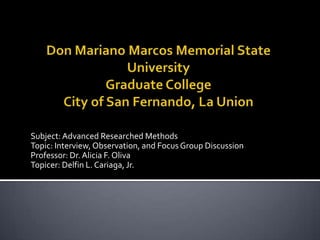
Interview
- 1. Don Mariano Marcos Memorial State UniversityGraduate CollegeCity of San Fernando, La Union Subject: Advanced Researched Methods Topic: Interview, Observation, and Focus Group Discussion Professor: Dr. Alicia F. Oliva Topicer: Delfin L. Cariaga, Jr.
- 2. Interview An interview is a conversation between two people (the interviewer and the interviewee) where questions are asked by the interviewer to obtain information from the interviewee. A question may be either a linguistic expression used to make a request for information, or else the request itself made by such an expression. This information may be provided with an answer.
- 3. Types of interviews Employment-related Exit interview An exit interview is an interview conducted by an employer of a departing employee. They are generally conducted by a relatively neutral party, such as a human resources staff member, so that the employee will be more inclined to be candid, as opposed to worrying about burning bridges Informational interview An Informational Interview is a meeting in which a job seeker asks for career and industry advice rather than employment. The job seeker uses the interview to gather information on the field, and to find employment leads and expand their professional network. This differs from a job interview because the job seeker asks the questions.
- 4. Etiquette for Informational Interviews prepare with research about the industry and the individual; arrange a time and place convenient to the professional; set a short time for the discussion (15 minutes is not unusual); have business cards available; dress appropriately; arrive promptly; ask well-prepared questions; offer to terminate the meeting at the end of the agreed time; offer to pay any bill associated with the meeting (from coffee to dinner tab); and write a personalized thank you note, preferably on stationery. and other actions appropriate for the industry to make a good first impression.
- 5. Job interview A job interview is a process in which a potential employee is evaluated by an employer for prospective employment in their company, organization, or firm. During this process, the employer hopes to determine whether or not the applicant is suitable for the job.
- 6. Observation Observation is either an activity of a living being, such as a human, consisting of receiving knowledge of the outside world through the senses, or the recording of data using scientific instruments. The term may also refer to any data collected during this activity. An observation can also be the way you look at things or when you look at something.
- 7. Observation in science The scientific method requires observations of nature to formulate and test hypothesis. It consists of these steps: Asking a question about a natural phenomenon Making observations of the phenomenon Hypothesizing an explanation for the phenomenon Predicting a logical consequence of the hypothesis Testing the hypothesis by an experiment, an observational study, or a field study Creating a conclusion with data gathered in the experiment
- 8. Focus group A focus group is a form of qualitative research in which a group of people are asked about their perceptions, opinions, beliefs and attitudes towards a product, service, concept, advertisement, idea, or packaging. Questions are asked in an interactive group setting where participants are free to talk with other group members.
- 9. Types of focus groups Variants of focus groups include: Two-way focus group - one focus group watches another focus group and discusses the observed interactions and conclusion Dual moderator focus group - one moderator ensures the session progresses smoothly, while another ensures that all the topics are covered Duelling moderator focus group - two moderators deliberately take opposite sides on the issue under discussion Respondent moderator focus group - one and only one of the respondents are asked to act as the moderator temporarily Client participant focus groups - one or more client representatives participate in the discussion, either covertly or overtly Mini focus groups - groups are composed of four or five members rather than 6 to 12 Teleconference focus groups - telephone network is used Online focus groups - computers connected via the internet are used
- 10. Benefits/strengths of focus group discussions Group discussion produces data and insights that would be less accessible without interaction found in a group setting—listening to others’ verbalized experiences stimulates memories, ideas, and experiences in participants. Group members discover a common language to describe similar experiences. Focus groups also provide an opportunity for disclosure among similar others in a setting where participants are validated.
- 12. Thank you for listening.....
